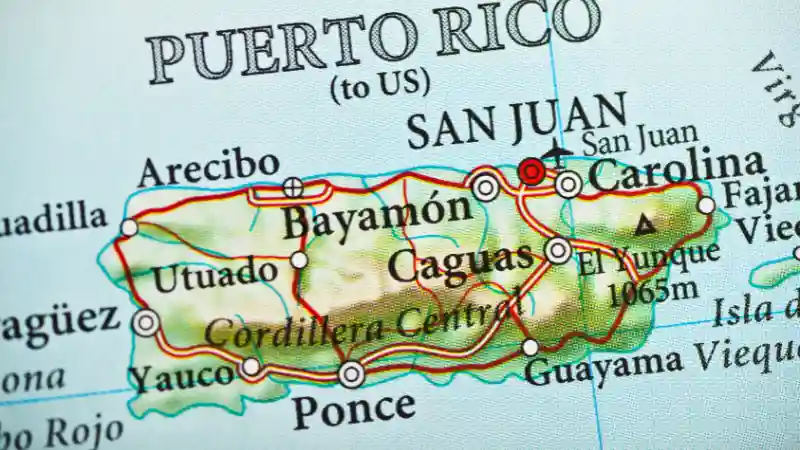Can felons go to Puerto Rico is one important question most felons often ask. Many individuals with felony convictions may wonder about the possibility of traveling to Puerto Rico, given the unique legal status of the territory. Understanding Puerto Rico’s travel restrictions for felons is crucial for those navigating post-conviction travel plans.
So, even if you’ve got a past that might raise some eyebrows at border control, fear not, we’re here to break down whether a sunny escape to Puerto Rico is still on the cards for you.
Can Felons Go To Puerto Rico?

Yes, a felon can travel to Puerto Rico. Puerto Rico is a United States territory, and as such, U.S. citizens, including ex-cons, can visit without a passport. However, they should ensure they meet any travel requirements, such as having a valid government-issued ID or passport for identification purposes. It’s also essential to check if there are any specific restrictions related to their criminal record for the activities they plan to engage in during their visit.
Overview Of Puerto Rico’s Entry Requirements
As a U.S. territory, Puerto Rico generally follows the same entry requirements as the mainland United States. However, there are some specifics you should consider:
1. Valid Passport Or Travel Document
U.S. citizens, including those with felony convictions, can travel to Puerto Rico with a valid government-issued photo ID, such as a driver’s license, and proof of citizenship like a birth certificate. However, a valid U.S. passport is strongly recommended for easier travel and identification. For non-U.S. citizens, a valid passport and appropriate visa or travel authorization are required.
2. COVID-19 Entry Requirements
Due to the ongoing pandemic, travelers to Puerto Rico must follow the latest COVID-19 travel guidelines. This may include providing proof of vaccination, a negative COVID-19 test result, or having fully recovered from COVID-19 within the past 90 days. Travel requirements may change, so it’s essential to check the most recent updates before your trip.
3. Criminal Record
As mentioned earlier, ex-cons can travel to Puerto Rico, but they should be aware of any local laws related to their specific felony convictions to avoid legal issues.
4. Travel Insurance
It’s always a good idea to have travel insurance for any unexpected situations during your trip, such as medical emergencies, trip cancellations, or lost baggage.
Remember to check for any updates or changes in entry requirements before your trip, as they may vary depending on your nationality, vaccination status, and the current pandemic situation.
Can A Felon On Probation Go To Puerto Rico?
Felons on probation can generally travel to PR, as it is a U.S. territory and does not have specific restrictions on probation status. However, they need to follow these guidelines:
1. Obtain Permission From Probation Officer
Before planning a trip to Puerto Rico, it is crucial to seek permission from the probation officer in charge of the individual’s case. They may need to provide written approval or documentation stating that the travel is allowed.
2. Comply With Probation Conditions
While in Puerto Rico, the individual should continue to adhere to the conditions of their probation, such as regular check-ins, curfews, and avoiding any criminal activity.
3. Carry Necessary Documentation
The individual should have a valid U.S. passport or other acceptable travel documents, along with proof of their probation status, such as a probation order or a letter from their probation officer.
4. Follow Puerto Rico’s, Local Laws
It is essential to be aware of and abide by Puerto Rico’s local laws, as any violation could result in legal consequences that may impact the individual’s probation status.
5. Travel Insurance
As with any traveler, it is a good idea for the individual to have travel insurance to protect against unforeseen circumstances during their trip.
Don’t forget that the specific requirements and restrictions may vary depending on the individual’s specific probation conditions and the jurisdiction they are under. It is always best to consult with their probation officer before making any travel plans.
Process For A Felon Seeking Entry To Puerto Rico
To assist felons seeking entry into this country, follow these steps:
1. Research Puerto Rico’s Immigration And Entry Requirements
Start by understanding the general entry requirements for Puerto Rico, a U.S. territory. You can find this information on the official Puerto Rico tourism website or the U.S. Customs and Border Protection (CBP) website.
2. Check For Any Specific Restrictions For Felons
Look for any specific entry restrictions for felons or individuals with criminal records. This information may be available on the CBP website or by contacting the Puerto Rico Immigration Office.
3. Consult With A Legal Professional
It is crucial for felons to consult with an experienced immigration attorney or legal professional who specializes in Puerto Rico’s entry requirements and restrictions. They can guide the specific steps and documentation needed for the individual’s unique situation.
4. Gather Necessary Documentation
Based on the legal professional’s advice, gather all the required documents, such as a valid passport, proof of legal rehabilitation, and any other supporting documents that may be needed.
5. Apply For Entry
Depending on the individual’s circumstances, they may need to apply for a visa or other travel authorization before traveling to Puerto Rico. Follow the instructions provided by the legal professional and the Puerto Rico Immigration Office.
6. Prepare For Potential Interviews Or Additional Screenings
Felons may face additional interviews or screenings upon arrival in PR. Be prepared to answer questions about their criminal history and provide any additional documentation requested by the immigration officials.
7. Stay Informed About Changes In Laws And Policies
Keep track of any changes in Puerto Rico’s immigration policies or laws that may affect felons seeking entry. This can be done by regularly checking the CBP and Puerto Rico Immigration Office websites or consulting with a legal professional.
8. Be Patient And Persistent
The process of seeking entry to Puerto Rico as a felon may take time and require multiple attempts. Maintain a positive attitude and be persistent in your efforts to follow the necessary steps and requirements.
Remember, every situation is unique, and it is essential to consult with a legal professional for personalized guidance and support.
Can A Felon Go To Puerto Rico With Pending Charges?
Traveling to Puerto Rico with pending felony charges can be a complex situation. As a U.S. territory, Puerto Rico generally allows U.S. citizens, including those with criminal records, to enter without a visa. However, it is crucial to consider several factors to ensure a smooth and legal journey.
1. Travel Documents
Ensure you have a valid U.S. passport or other acceptable travel documents. This will be required for identification and entry into Puerto Rico.
2. Background Checks
Upon arrival in Puerto Rico, you may be subject to background checks by U.S. Customs and Border Protection (CBP) officers. The specific outcome of these checks depends on the nature of your charges and the discretion of the officers.
3. Travel Restrictions
While Puerto Rico does not have specific restrictions on entry for offenders with pending charges, it’s essential to be aware that some countries might not allow entry to individuals with criminal records. If you have plans to travel to other countries after Puerto Rico, research their entry requirements carefully.
4. Legal Issues Abroad
It is crucial to adhere to the local laws and respect the jurisdiction of Puerto Rico’s legal system. If you get into legal trouble while in Puerto Rico, you may face additional consequences.
5. Consult With Professionals
Before traveling, consult with an attorney or a trusted travel professional for personalized guidance on your specific situation. They can provide you with advice on how to navigate any potential challenges related to your pending felony charges.
In summary, while it is possible to travel to Puerto Rico with pending felony charges, it is essential to have the necessary travel documents, be prepared for potential background checks, and respect the laws of the territory. Always consult with professionals for personalized advice to ensure a safe and legal journey.
Impact Of Felony Convictions On Entry To Puerto Rico
The impact of felony convictions on entry to Puerto Rico is similar to that of many other jurisdictions. Individuals with felony convictions may face certain restrictions or challenges when attempting to enter the island. However, the specific consequences can vary depending on the nature of the felony, the individual’s immigration status, and the purpose of their entry.
1. Immigration
If an individual is a foreigner with a felony conviction, they may face difficulties in obtaining a visa or permission to enter Puerto Rico. The U.S. Customs and Border Protection (CBP) and U.S. Immigration and Customs Enforcement (ICE) have the authority to deny entry or deport individuals with criminal records, especially if the felony is considered a crime involving moral turpitude (CIMT).
2. Employment
Having a felony conviction may limit job opportunities in Puerto Rico, as some employers conduct background checks and may be hesitant to hire individuals with criminal records. However, there are resources available to assist ex-offenders in finding employment, such as the Puerto Rico Department of Labor and Human Resources.
3. Housing
Individuals with felony convictions may face challenges in finding housing in Puerto Rico, as some landlords perform background checks and may deny tenancy based on a criminal record. However, some organizations provide housing assistance to ex-offenders, such as the Puerto Rico Housing Authority.
4. Voting Rights
In Puerto Rico, individuals with felony convictions lose their voting rights while they are incarcerated and for some time following their release, depending on the nature of the felony. This period can range from 5 to 10 years.
5. Professional Licenses
Certain professions in Puerto Rico require licenses, and having a felony conviction may impact an individual’s ability to obtain or maintain these licenses. It is essential to check with the relevant licensing board for specific information on how a felony conviction may affect one’s professional status.
Felony convictions can have a significant impact on an individual’s ability to enter and navigate life in Puerto Rico. Those with criminal records must seek assistance and information regarding their specific situation to overcome potential challenges and reintegrate into society.
Legal Considerations For Felons Traveling To San Juan, PR

There are several legal considerations for ex-cons traveling to Puerto Rico:
1. Entry restrictions
Ex-cons may face restrictions when entering Puerto Rico, as they may be deemed inadmissible under the Immigration and Nationality Act. It is important for felons to research the entry requirements and potential restrictions before planning their trip.
2. Probation Or Parole Restrictions
Felons on probation or parole may have restrictions on traveling, including leaving the country. It is important for felons to consult with their probation or parole officer before planning their trip to ensure they comply with any travel restrictions.
3. Firearms Laws
Felons are typically prohibited from possessing firearms, and this restriction may also apply in PR. Be aware of the firearms laws in the country and ensure they comply with any restrictions.
4. Visa Requirements
You may face additional scrutiny when applying for a visa to enter Puerto Rico, as your criminal history may be considered in the visa approval process. It is important for felons to be honest about their criminal history when applying for a visa and to provide any necessary documentation related to their conviction.
5. Legal Representation
Former offenders traveling to Puerto Rico may want to consider consulting with a legal professional familiar with immigration and criminal law to ensure they comply with all legal requirements during their trip.
Overall, ex-cons traveling to Puerto Rico should be aware of the legal considerations mentioned above and take proactive steps to ensure they comply with all relevant laws and regulations.
Find out other places/countries felons can go to:
Tips For Successful Travel Planning
Successful travel planning involves careful organization, research, and flexibility. Here are some tips to help you plan your trip efficiently and enjoy a stress-free experience:
1. Set A Budget
Determine how much you can afford to spend on your trip, including transportation, accommodation, food, activities, and souvenirs. This will help you make informed decisions and avoid overspending.
2. Choose A Destination
Research various destinations based on your interests, preferences, and budget. Consider factors such as climate, local culture, attractions, and safety.
3. Decide On Travel Dates
Be flexible with your travel dates to find the best deals on flights and accommodations. Traveling during off-peak seasons or shoulder months can help you save money.
4. Book Flights
Compare prices across multiple airlines and booking platforms to find the best deals. Sign up for fare alerts to be notified of any price drops.
5. Choose Accommodation
Consider your budget, location preferences, and amenities when selecting a place to stay. Options include hotels, resorts, vacation rentals, hostels, or homestays.
6. Plan Activities
Research local attractions, landmarks, and events to create an itinerary of things you’d like to do during your trip. Prioritize your must-see sights and leave room for spontaneity.
7. Pack Smart
Make a packing list well in advance, ensuring you have all the necessary items for your trip. Consider the climate and activities you’ll be participating in to pack appropriately.
8. Stay Organized
Keep all your travel documents, including passports, visas, tickets, and reservations, in a safe and accessible place. Create digital copies to store in a separate location in case of emergencies.
9. Be Flexible
Allow for some flexibility in your itinerary, as unexpected situations may arise during your trip. Be open to changing plans or trying new experiences.
10. Enjoy The Journey
Traveling is not just about the destination; it’s also about the experiences along the way. Embrace new cultures, meet locals, and make the most of every moment.
11. Be Honest And Transparent
When filling out immigration forms or interacting with authorities, it is crucial to be honest about your background. Being upfront about your past can help avoid potential complications during your trip.
12. Stay Informed
Stay updated on any changes to travel regulations or policies that may affect your visiting Puerto Rico. Being informed can help you navigate potential challenges more effectively.
13. Seek Legal Advice
If you have concerns about traveling to Puerto Rico as a felon, consider consulting with a legal professional for personalized guidance and advice.
By following these tips, you can plan a successful trip that meets your expectations and allows you to enjoy a memorable experience.
Summary

Just as the article reads in the beginning, ex-cons can visit Puerto Rico, but they should be aware of the specific entry requirements and restrictions that may apply to their situation. They must consult with an experienced immigration attorney or legal professional who specializes in Puerto Rico’s entry requirements and restrictions. This legal guidance will help them understand the necessary steps and documentation needed for their unique circumstances.
Felons should gather all the required documents, apply for entry or necessary travel authorization, and prepare for potential interviews or additional screenings upon arrival. They should also stay informed about any changes in Puerto Rico’s immigration policies or laws that may affect them.
Being patient and persistent throughout the process is essential, as the situation of a felon seeking entry to Puerto Rico can be complex and time-consuming. Ultimately, the ability of a felon to travel to Puerto Rico depends on their circumstances, the specific requirements and restrictions in place, and their willingness to follow the necessary steps to ensure a smooth entry process.

I’m Cli, also known as Castro. An author of felhus.com
I’ve got great passion for felons and wanna see them live absolutely normal again.
